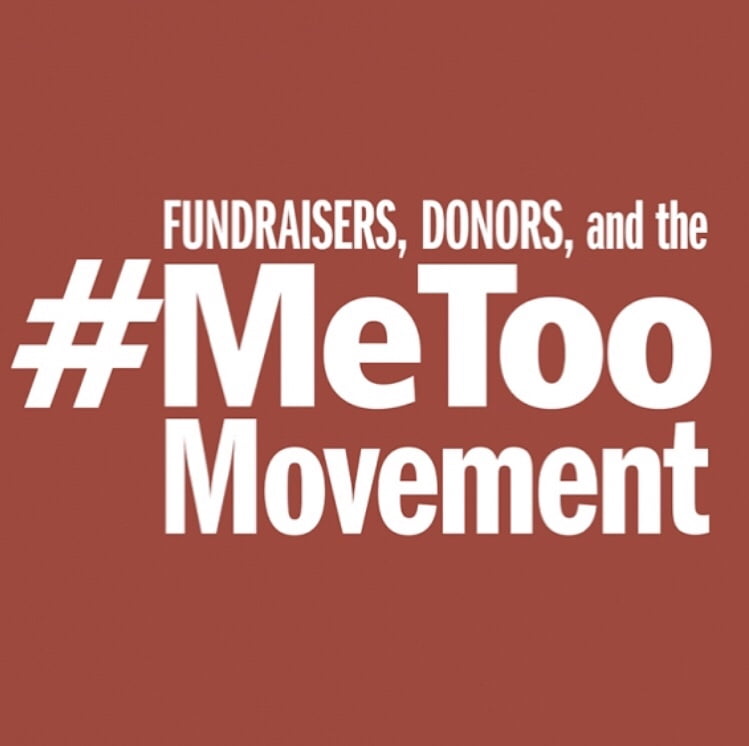Almost half of all fundraisers have some sort of personal experience with sexual harassment, with a quarter of all female fundraisers having been sexually harassed during their careers, according to a new survey by the Association of Fundraising Professionals (AFP) and The Chronicle of Philanthropy, andconducted independently online by the Harris Poll.
The survey, the first comprehensive study of its kind about sexual harassment in the fundraising profession, found that 48 percent of respondents had either personally experienced, witnessed, and/or heard second-hand about incidents of sexual harassment. One in four women have experienced sexual harassment in the fundraising field, and seven percent of men have experienced the same.
In 65 percent of the cases reported in the survey, the perpetrator of the harassment was a donor, and in nearly all cases (96 percent), the perpetrator was a male.
“The number of cases involving donors is eye-opening and points to a unique and very troubling situation within the profession,” said Mike Geiger, MBA, CPA, president and CEO of AFP. “As we look at how to proceed with the data from the survey and begin developing anti-harassment education and training for fundraisers and others in the charitable sector, we will have a special focus on the all-important donor-fundraiser relationship. We know most donors have only the best interest of the cause at heart, but our message will be clear: no donation and no donor is worth taking away an individual’s respect and self-worth and turning a blind eye to harassment.”
More than a quarter (27 percent) of respondents believe that donors are prioritized and have more rights than they do, and 13 percent feel that their organization places a greater value on the loyalty of donors than the safety of its staff. The numbers increase for those who have personally experienced sexual harassment, witnessed or been told about another’s experiences.
Prevalence of Harassment
In total, 21 percent of all respondents to the survey (men and women) have personally experienced harassment, while 16 percent of all respondents have witnessed harassment, and 26 percent have been told about incidents of harassment.
The most common types of sexual harassment experienced in the fundraising profession include inappropriate sexual comments (80 percent) or unwanted touching or physical contact (55 percent). Harassment is not typically a one-time occurrence either. Almost three-quarters (74 percent) reported having had at least two harassment experiences, and 51 percent have had three or more.
“While we work to improve communities around the world, it’s clear the fundraising profession is not immune to the problems of sexual harassment,” said Ann Hale. “Regardless of where the harassment comes from—supervisors, colleagues, donors or whomever—AFP is committed to addressing this critical issue and providing tools and resources to help stop and prevent sexual harassment from occurring. This data is exactly why we developed the Women’s Impact Initiative this year, and we’re grateful to the Chronicle for their support of this important survey.”
AFP’s Women’s Impact Initiative, launched on International Women’s Day, is a two-year campaign focusing on issues related to women in the profession, including harassment, salary inequity and lack of women in fundraising leadership positions. The sexual harassment survey is the first major project in the Women’s Impact Initiative.
Organizational Responses
One of the key tools flowing from the survey will be steps, advice and guidance to ensure action is taken when harassment occurs.
“A big takeaway from the survey is that many fundraisers like their organizations and believe it will support them if harassment occurs,” said Tycely Williams, chair of AFP’s Women’s Impact Initiative. “But at the same time, the data shows that once harassment was reported, often times very little was done. We need to begin a larger conversation with everyone in the sector about what we can all do to not only prevent harassment, but respond appropriately and timely when it does occur.”
More than 8 in 10 respondents (81 percent) have at least somewhat favorable views of the organization for which they work, and nearly all (94 percent) are at least somewhat satisfied with their organization’s culture towards sexual harassment. The vast majority (91 percent) are optimistic that their organization would support them if they personally experienced sexual harassment in the workplace.
But the reality is different. According to respondents who have experienced sexual harassment and told their organization, in many cases (71 percent of the time) no action was taken against the perpetrator after the incident has been reported. Over half (53 percent) are not very or not at all satisfied with how their manager, supervisor or organization responded to their allegation of sexual harassment. Even more critically, more than one-third of respondents (35 percent) have even felt a negative impact on their career through raising their incidents of harassment.
Changing Culture
Overall, fundraising professionals believe that the culture within the profession is changing with respect to sexual harassment. More than 9 in 10 (92 percent) believe that sexual harassment allegations in fundraising are more likely to be taken seriously today than ever before. The majority (82 percent) observes the #MeToo movement having a positive influence on the general workplace environment.
In addition, 93 percent of fundraising professionals want a “zero tolerance policy” enacted in every workplace in their country, and 7 in 10 feel very strongly that this should be the norm.
“Fundraising has been responsible for so much positive change in the world, and now we need to be at the forefront of change within our own profession,” said Geiger. “This survey should be a call to action to everyone in fundraising and philanthropy. As the largest community of fundraisers in the world, AFP is prepared to take the lead on the issue, and we look forward to working with organizations across the sector in addressing and ultimately solving the issue of sexual harassment.”
More information about the survey and the Women’s Impact Initiative can be found at www.afpidea.org/wii.






